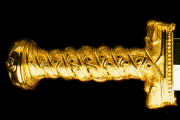The Shakespeare Secret
Although William Shakespeare is arguably the most famous writer in history, very little is known about his personal life. In 1994, in his controversial book The Shakespeare Conspiracy, Graham revealed historical evidence suggesting that William Shakespeare worked as a government informant, spying on political opponents of Queen Elizabeth I. Now, twelve years later, Graham is investigating further evidence which suggests that Shakespeare the playwright (and possible spy) and William Shakespeare of Stratford-upon-Avon may have been two entirely different people.
For around a decade either side of the year 1600 a William Shakespeare is recorded as both a playwright and actor associated with various theatre companies in London. In 1623 his collective works first appeared in print in London, in the so-called First Folio which contained 36 plays. When Shakespeare wrote these plays between about 1593 and 1611 the public do not appear to have had the slightest interested in where he originated; it was not until the late 1600s that his plays became universally popular and speculation began as to Shakespeare’s home town. The only clue was a reference in the preface to the First Folio by Shakespeare’s fellow playwright Ben Jonson, in which he refers to William Shakespeare in association with a place called Stratford. When literary fans examined the records of Stratford-upon-Avon in Warwickshire they found that there was indeed a William Shakespeare who had lived there during the period in question. From then on few people questioned that the William Shakespeare of Stratford-upon-Avon was the author of the famous plays.
Shakespeare’s Home Town
The historical records concerning William Shakespeare’s life reveal many strange paradoxes. While the records from the theatrical world in London show that he worked as an actor and playwright, the contemporary documentation from Stratford-upon-Avon reveals no theatrical or literary interests of any kind. No record exists of Shakespeare receiving an education, buying a single book or writing poems or plays. Over the years this enigma has led to speculation that Shakespeare was not the author of the plays attributed to him. Various candidates have been proposed as the “real” author, such as the English statesman Francis Bacon and the earls of Oxford and Derby who, it has been speculated, used Shakespeare as a frontman as they wished for various reasons to remain anonymous. The only problem with this theory is that it makes no sense. Why pick a frontman who seems to have had no literary connections - at least none that he advertised in Stratford-upon-Avon?
A Paradoxical Life
The Merchant of Stratford
The only evidence that Shakespeare was publicly recognized during his life as a playwright in Stratford-upon-Avon is the monument overlooking his grave in Stratford's Holy Trinity Church. It is a bust depicting the Bard composing his works. Such monuments were erected to honour a deceased person’s professional standing and, as such, depicted him holding something associated with his profession. The present bust shows Shakespeare as a writer with a quill and paper. To the modern visitor it appears that Shakespeare was recognized as a playwright in Stratford at the time of his death. However, the church records reveal that this particular bust was not erected until 1748. It was commissioned by a theatrical manager named John Hall who wished to promote the tourist industry in the town. Fortunately, an illustration of the original monument still survives as an engraving in the work of the seventeenth-century historian William Dugdale: his Antiquities of Warwickshire published almost a century earlier in 1656. Here there is no quill or paper; instead Shakespeare is shown with his hands on a sack. It seems he was being depicted as a dealer in bagged commodities. In fact, this is exactly how the records of Stratford-upon-Avon reveal that William Shakespeare made a living – as a grain merchant. He buys sizable tracts of land, he holds large stocks of grain, and he takes action to recover debts owned for the supply of malt. Leaving aside the London records and considering only his life in Stratford, the logical conclusion would be that William Shakespeare was merely a dealer in grain.

Right: The 1623 First Folio. In a preface to this first published edition of Shakespeare's plays a mention is found of the playwright's association with Stratford. However, was Stratford-upon-Avon is the location in question?

Right: Francis Bacon, one of the proposed authors of the Shakespeare plays.


Shakespeare’s tomb memorial at Holy Trinity Church, Stratford, depicting a writer. This present monument was erected in 1748 by a theatrical manager named John Hall.
The illustration of Shakespeare’s original tomb memorial from William Dugdale's Antiquities of Warwickshire published in 1665, showing a dealer in bagged commodities.
Page 1 of 2








